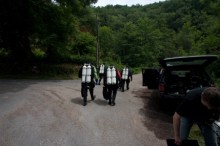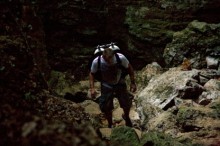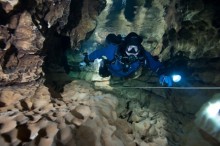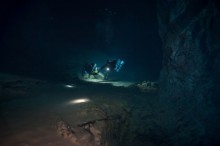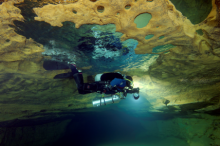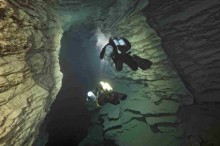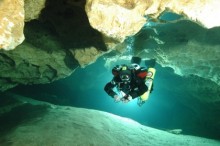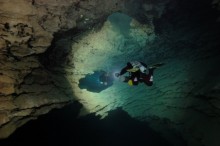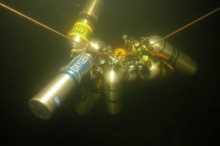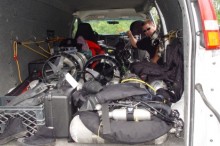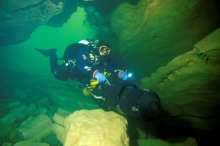The most advanced form of technical diving is cave diving. Due to the closed space, the darkness and the lack of possibility to emerge, such dives entail serious risks in case of any trouble occurring. There is no place for mistakes or insufficient training.
Cave diving requires good body condition – much better than wreck diving or deep technical diving. During cave diving, we usually face a long distance – often of more than 1 km during one dive, half of it upstream. In certain caves it is extremely exhausting. Poor body condition will make it impossible to cover such distance and lead to extensive gas consumption followed by breathlessness and CO2 poisoning, which eventually might cause an accident. Entering some caves – especially in Europe – requires a long walk with all the equipment on the back.
So why do some people choose this form of diving? What do we get in exchange?
Beauty in its purest form and peace unreachable anywhere else. It feels like an expedition to another planet. Unusual patterns and play of light.
Such dives can be performed regardless of the weather or season of the year. It is possible to dive at any time of day or night. While going to cave diving, you can be sure that you actually will dive. Stable conditions (despite visibility) – you know exactly what to expect. This form of technical diving is much cheaper than wreck diving with trimix, and it is equally exciting. Unfortunately, just cave training is not enough. You have to be aware that only a few percent of all the divers have skills sufficient for completing cave diving course and therefore for diving in caves, but skills are not enough…
Less than one percent of all the divers have physical predisposition and approach required for diving and surviving in caves. Choosing such dives, you must be aware of risks and danger posed by them.
Cave diving trainings can be divided into a few groups, based on their difficulty level that allows a diver to acquire proper experience. I run cave diving courses at IANTD of all the difficulty levels.
Duration:– 2 days.
Prerequisites: Any diver from AOWD up, decent buoyancy control
Equipment: any kind, spinning wheel, 2 light sources
This course is impossible to perform in some places around the world. It is often combined with an Intro to Cave course.
Duration: 2-3 days (4-6 dives)
Prerequisites: AOWD and Cavern or Wreck
Equipment: twinset, long hose, spinning wheel, 3 light sources.
Training in basic cave techniques and cave rescue
Duration: about one week (minimum of 8 dives, usually twice more)
Prerequisites: 50 dives and Intro Cave or a minimum of 100 dives
Equipment: twinset, long hose, wing and plate or soft pack, 3 light sources, spinning wheel and spool, cutting device, cave arrows
Full diving techniques training, including installing jump lines, using a guideline, using arrows. Further development by acquiring more experience and gradually extending difficulty level or by attending more courses.
The course can be combined with a Cave diver course.
Greater possibilities given by a scooter are followed by higher possible risks.
If you think you are ready for such dives, call me and we will discuss the best way of you further development.

